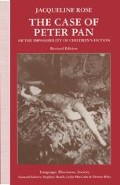Abstract
The House Governor of the Great Ormond Street Hospital is concerned to stress that Peter Pan is not dead. He has good reason. Since 1929, when Barrie left the rights on Peter Pan to the Hospital for Sick Children, it has accounted for anything up to a third of the hospital’s annual income. The exact sum remains undisclosed. Barrie himself stipulated that it should be kept secret.1
Access this chapter
Tax calculation will be finalised at checkout
Purchases are for personal use only
Preview
Unable to display preview. Download preview PDF.
Notes
Milton Shulman in the Evening Standard (‘Barrie’s Heroes Win Through’, 21 December 1979)
and Irving Wardle in The Times (‘Peter Pan’, 21 December 1979); also: ‘Part of the attraction of Peter Pan is that the production never changes’ (Jane Ellison, ‘Tinkerbell Lives’, Evening Standard, 21 December 1978) and ‘The fantasy, nearly three-quarters of a century old now, can still keep one listening and watching; however this speech or the other seems ripe for cutting, it is clear that the strange old piece is uncuttable’ (The Lady, 18 January 1979).
See also G. R. Sims, Without the Limelight (Sims, 1900, Chapter 1 ‘The Christmas Fairy’, pp. 1–18); Sims starts his account of theatrical life with a description of the dress rehearsal of Dick Whittington at the Theatre Royal, Northerton.
See J. T. Grein, ‘The Drama in London in 1907’ (The Green Room Book, 1908) (references to John Valentine, The Stronger Sex, W. S. Maugham, Lady Frederick, W.J. Locke, The Morals of Marcus); Sidney Dark, ‘The Theatrical Season of 1908, a Retrospect and Review’ (The Green Room Book, 1909) (references to Charles Dickens, The Mystery of Edwin Drood and W.J. Locke, The Beloved Vagabond);]. M. Barrie’s The Little Minister (1891) was produced in a stage version in Washington and London in 1897; the link — from book to play — also worked the other way round, with booksellers commenting on the popularity of books connected with the stage or based on contemporary plays (‘Wholesale Report of the Bookselling Trade’, The Bookman, 22 (127), April 1902).
Frederick Farrar, author of Eric, or, Little by Little (Farrar, 1858), makes a similar point in relationship to the reading of his youth: ‘the blight of cheap literature had not yet descended upon the land … the schoolboy of those days was at least saved, in spite of himself, from becoming the debauchee of shoddy fiction’ (quoted in Darton (1932) 1982, p. 288).
Copyright information
© 1992 Jacqueline Rose
About this chapter
Cite this chapter
Rose, J. (1992). Peter Pan and Commercialisation of the Child. In: The Case of Peter Pan or The Impossibility of Children’s Fiction. Language, Discourse, Society. Palgrave Macmillan, London. https://doi.org/10.1007/978-1-349-23208-6_5
Download citation
DOI: https://doi.org/10.1007/978-1-349-23208-6_5
Publisher Name: Palgrave Macmillan, London
Print ISBN: 978-0-333-60401-4
Online ISBN: 978-1-349-23208-6
eBook Packages: Palgrave Literature & Performing Arts CollectionLiterature, Cultural and Media Studies (R0)

